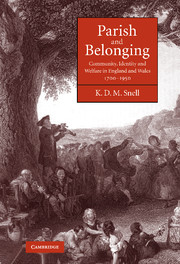Book contents
- Frontmatter
- Contents
- List of figures
- List of tables
- Preface and acknowledgements
- 1 Introduction – belonging and local attachment
- 2 The culture of local xenophobia
- 3 Settlement, parochial belonging and entitlement
- 4 Rural societies and their marriage patterns
- 5 ‘A cruel kindness’: parish out-door relief and the new poor law
- 6 Nailed to the church door? Parish overseers and the new poor law
- 7 Three centuries of new parishes
- 8 ‘Of this parish’: gravestones, belonging and local attachment
- 9 Conclusion – belonging, parish and community
- Select bibliography
- Subject and persons index
- Places index
3 - Settlement, parochial belonging and entitlement
Published online by Cambridge University Press: 27 July 2009
- Frontmatter
- Contents
- List of figures
- List of tables
- Preface and acknowledgements
- 1 Introduction – belonging and local attachment
- 2 The culture of local xenophobia
- 3 Settlement, parochial belonging and entitlement
- 4 Rural societies and their marriage patterns
- 5 ‘A cruel kindness’: parish out-door relief and the new poor law
- 6 Nailed to the church door? Parish overseers and the new poor law
- 7 Three centuries of new parishes
- 8 ‘Of this parish’: gravestones, belonging and local attachment
- 9 Conclusion – belonging, parish and community
- Select bibliography
- Subject and persons index
- Places index
Summary
Settlement is that right which a parishioner becoming impotent or poor has of claiming relief from the funds raised by means of the poor's rate, by virtue of the social relationship or connection which subsists between him and the other members of the parish. This right is always acquired in that parish or place in which parishioners have acquired their last legal settlement.
The whole experience of the poor law shows, with what a degree of selfishness parishes deal with those upon whom they look as strangers to themselves; they have never hesitated to condemn a man to the worst evils if he was a charge to them and they could remove him. There has been no want of vigour on the part of parishes in dealing with those classes of poor whom they did not recognise as their own.
‘Anybody can have roots if they want them’, I said.
‘Human beings are like strawberry plants.’
INTRODUCTION
The Revd Anthony Huxtable was rector of Sutton Waldron, near Shaftesbury in Dorset. He was a poor law guardian, one of the more regular attendants at board meetings. He was also a farmer, with a farm of about 100 acres on the high chalk downland, bordering upon the Vale of Blackmore. In May 1847 he was called before the Select Committee on Settlement and Poor Removal. His evidence underlined the importance of the laws of settlement to the poor, and also discussed people's local attachments in Dorset.
- Type
- Chapter
- Information
- Parish and BelongingCommunity, Identity and Welfare in England and Wales, 1700–1950, pp. 81 - 161Publisher: Cambridge University PressPrint publication year: 2006
- 1
- Cited by



